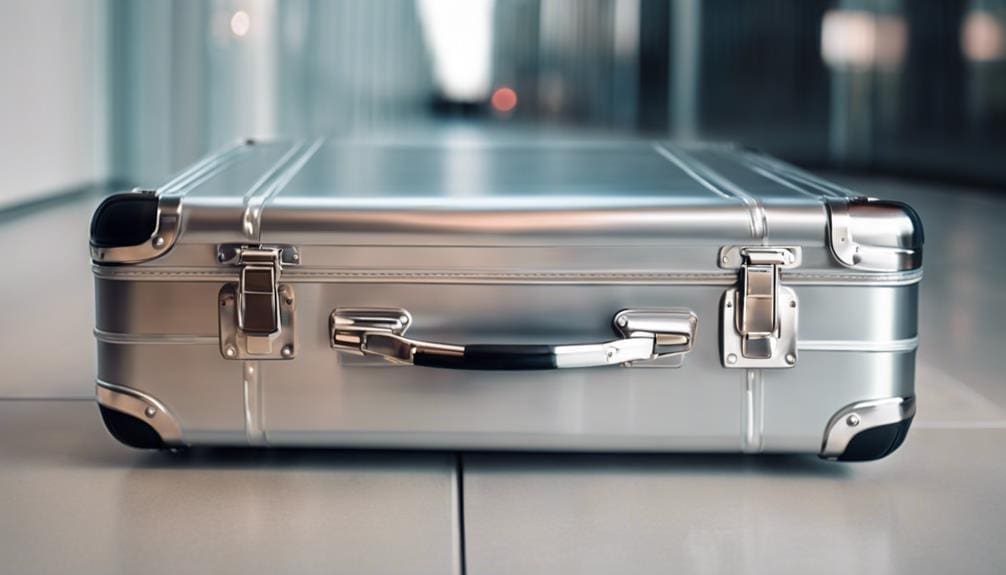When selecting luxury luggage, consider this: Polycarbonate suits weight-conscious travelers with its durability and lightness. It handles rough handling well, maintains structural integrity, and prevents shattering. On the other hand, aluminum portrays elegance with its sophisticated appearance, offering superior protection against compression. It’s heavier, but ideal for security-focused voyagers valuing durability. The choice between the two hinges on your need for lightweight ease or lasting sturdiness. Your travels deserve the best, so choose wisely.
Key Takeaways
- Polycarbonate is lighter, ideal for weight-conscious travelers.
- Aluminum offers superior protection for valuables, prioritizing durability.
- Consider travel needs when choosing between weight and security.
- Polycarbonate emphasizes weight limits, aluminum focuses on robustness.
- Select based on personal preferences, either lightweight or durable.
Durability and Impact Resistance
When comparing the durability and impact resistance of polycarbonate and aluminum in luxury luggage, both materials showcase unique strengths that cater to different needs. Polycarbonate, known for its high impact resistance, excels in withstanding rough handling and heavy pressure. This makes it a suitable choice for travelers who prioritize flexibility and toughness in their luggage. Despite being more prone to surface scratches, polycarbonate maintains its structural integrity well, ensuring that the suitcase remains intact even after enduring external forces.
Furthermore, polycarbonate offers good impact resistance, particularly in scenarios requiring flexibility. It provides a level of give that can prevent cracking or shattering under pressure, making it a reliable option for travelers who want a balance between durability and adaptability in their luggage choice. While aluminum showcases superior durability against dents and punctures, polycarbonate’s unique properties make it a compelling option for those seeking a resilient yet flexible travel companion.
Weight Considerations for Travelers
When choosing between polycarbonate and aluminum luggage, the weight of the suitcase can greatly impact your packing decisions and travel experience.
Travelers must consider weight restrictions imposed by airlines like Delta and American, making polycarbonate suitcases a practical choice due to their lighter construction.
Understanding how weight factors into your luggage choice is essential for a seamless travel process.
Weight Impact on Packing
Taking into account weight limits for air travel, travelers often face an important decision between aluminum and polycarbonate luggage options. When it comes to weight impact on packing, polycarbonate luggage shines due to its lightweight nature, allowing you to maximize packing without worrying about exceeding airline restrictions. Here are some key points to keep in mind:
- Polycarbonate suitcases are notably lighter than aluminum options.
- Travelers can pack more items in polycarbonate luggage without surpassing weight limits.
- Weight considerations play a crucial role in avoiding additional fees and inconvenience at airports.
- Despite being lighter, polycarbonate suitcases still offer a high level of durability.
- Polycarbonate luggage can withstand substantial weight, making it an excellent choice for weight-conscious travelers.
Travel Restrictions on Weight
Given the weight impact on packing, travelers must be mindful of airline restrictions when choosing between polycarbonate and aluminum luggage options, especially regarding the current subtopic of Travel Restrictions on Weight. Airlines like Delta and American have specific weight limits for checked luggage, making your suitcase’s weight essential. Lighter polycarbonate suitcases can help you pack more efficiently without surpassing these restrictions. However, if you have valuable items, the extra protection an aluminum suitcase provides might outweigh the weight concerns. When passing through the airport’s conveyor belt, having a luggage that meets weight requirements is vital to avoid additional fees or delays. Consider the table below for a quick comparison:
| Aspect | Polycarbonate Suitcase | Aluminum Suitcase |
|---|---|---|
| Weight | Lighter | Heavier |
| Protection | Standard | Extra |
| Airline Fees | Less likely | More likely |
| Durability | Moderate | High |
Design Versatility and Aesthetics
For those seeking a luggage design that reflects their personality and style preferences, the choice between polycarbonate and aluminum presents distinct options with regards to aesthetics and versatility.
When considering the design versatility and aesthetics of aluminum luggage, here are some key points to keep in mind:
- Aluminum exudes a luxurious look, perfect for those who prefer a sophisticated and elegant style.
- Business travelers often opt for aluminum cases due to their professional appearance and sleek design.
- Limited edition aluminum cases offer a blend of style and durability, providing a fashionable yet functional option for frequent travelers.
- The association of aluminum with luxury and status makes it a statement piece that sets travelers apart with a touch of wealth.
- The sleek and timeless design of aluminum luggage appeals to those who value both style and substance in their travel accessories.
Structural Integrity and Protection
In evaluating the structural integrity and protective qualities of polycarbonate and aluminum luggage, it’s essential to take into account their respective abilities to withstand external pressures and impacts during travel.
When considering an aluminum suitcase, it’s known for its robust nature. Unlike polycarbonate, which can bulge when overpacked, potentially compromising its shape, an aluminum suitcase won’t close properly if overfull, maintaining its structural integrity. Additionally, while polycarbonate may compress under external weight, risking damage to items inside, aluminum provides superior protection against compression, safeguarding fragile belongings effectively.
It’s important to note that polycarbonate is prone to scratches, whereas aluminum is more likely to dent under pressure. If you prioritize structural integrity and protection for your belongings during travel, an aluminum suitcase might be the superior choice due to its durability and resistance to external impacts.
Longevity and Wear Over Time
Shifting from evaluating the structural integrity and protective qualities of polycarbonate and aluminum luggage, the focus now moves to examining the longevity and wear over time of these materials in luxury luggage options.
When it comes to aluminum suitcases, they’re renowned for their exceptional durability and ability to last a lifetime, making them a reliable choice for frequent travelers. On the other hand, polycarbonate suitcases offer good wear resistance and can withstand hundreds of miles of travel without significant signs of wear and tear, ensuring a long lifespan for the traveler.
Both aluminum and polycarbonate suitcases provide excellent longevity, with aluminum options specifically designed to withstand extreme conditions like nuclear war, emphasizing their exceptional durability. In contrast, polycarbonate suitcases maintain their quality even after extensive use, further solidifying their reputation for enduring wear over time.
Personal Preference and Travel Needs
When considering luxury luggage materials like polycarbonate and aluminum, your personal style preferences may clash with your desire for durability. Think about how you prioritize style versus durability when choosing between the two materials.
Also, reflect on the weight and capacity each material offers based on your travel needs to make the best choice for your luggage.
Style Versus Durability
From selecting your luxury luggage material to match your personal style to meeting the demands of frequent travel, the choice between polycarbonate and aluminum boils down to a delicate balance of preferences and practical needs. When considering style versus durability in luxury luggage, here are some key points to keep in mind:
- Express Yourself: Polycarbonate offers stylish designs and vibrant colors, perfect for fashion-conscious travelers.
- Protect Your Belongings: Aluminum provides superior durability and protection for your items, ideal for those who prioritize safety.
- Find the Balance: It’s essential to strike a balance between expressing your personality and ensuring your luggage can withstand the rigors of travel.
- Consider Your Preferences: Think about what matters most to you – style or durability – when making your choice.
- Match Your Needs: Tailor your decision to your travel frequency and destination types to make sure your luggage meets your specific requirements.
Weight and Capacity
Considering your personal preferences and travel needs, the choice between polycarbonate and aluminum luggage hinges on the balance between weight and capacity. Polycarbonate suitcases are lighter than aluminum options, making them ideal for travelers concerned about weight limits. They’re easier to lift and maneuver, catering to those prioritizing ease of handling.
On the other hand, aluminum suitcases, while heavier, offer superior protection for valuable items during travel. If durability and security are your top concerns, aluminum might be the better choice. However, if you value lightweight luggage that’s easy to carry around, polycarbonate suitcases would be more suitable for your needs.
Ultimately, your decision should align with your specific travel requirements and comfort preferences.
Frequently Asked Questions
Is Aluminum or Polycarbonate Better for Luggage?
For luggage durability comparison, aluminum offers superior protection for delicate items and is ideal for long-term use. Polycarbonate, though lighter and scratch-prone, suits weight-conscious travelers. Choose aluminum for lasting quality and polycarbonate for lightweight convenience.
What Is the Best Material for Luggage Bags?
When deciding on the best material for luggage bags, consider the durability comparison between aluminum and polycarbonate. Evaluate your travel needs, style preferences, and budget to find the perfect balance of protection, weight, cost, and aesthetics.
Is Aluminium Luggage Better?
When considering durability, aluminum luggage shines with its robust build and long-lasting quality. The hard shell barrier of aluminum provides excellent protection for your belongings, making it a solid choice for those who prioritize security and longevity.
Do Polycarbonate Suitcases Crack?
Yes, polycarbonate suitcases are durable and less likely to crack compared to rigid materials under pressure. Their flexibility helps distribute force and absorb impact, making them a reliable choice for travelers concerned about suitcase damage.
Conclusion
To wrap up, when comparing polycarbonate and aluminum in luxury luggage, both materials offer unique advantages. Polycarbonate excels in impact resistance and design versatility, while aluminum provides structural integrity and longevity.
Travelers must consider their priorities, whether it be durability, weight, aesthetics, or protection. Ultimately, the choice between polycarbonate and aluminum comes down to personal preference and individual travel needs.
Choose wisely to guarantee your luggage meets your requirements for years to come.














